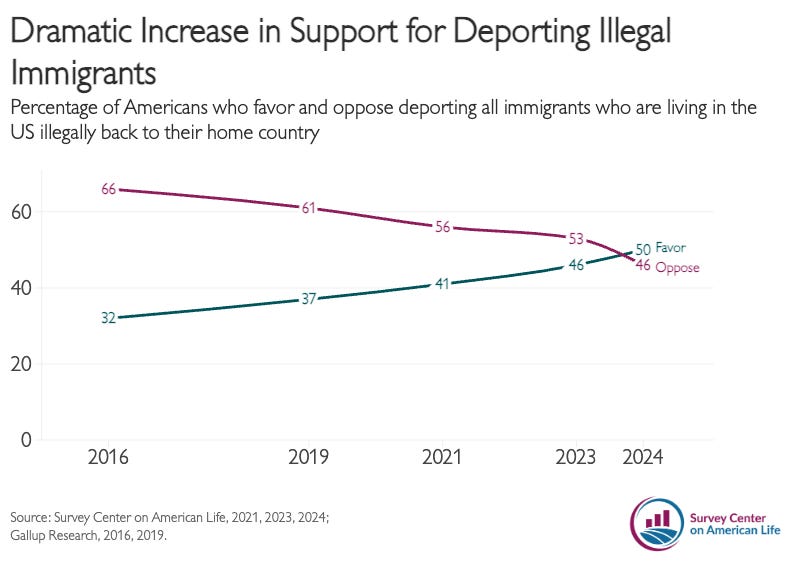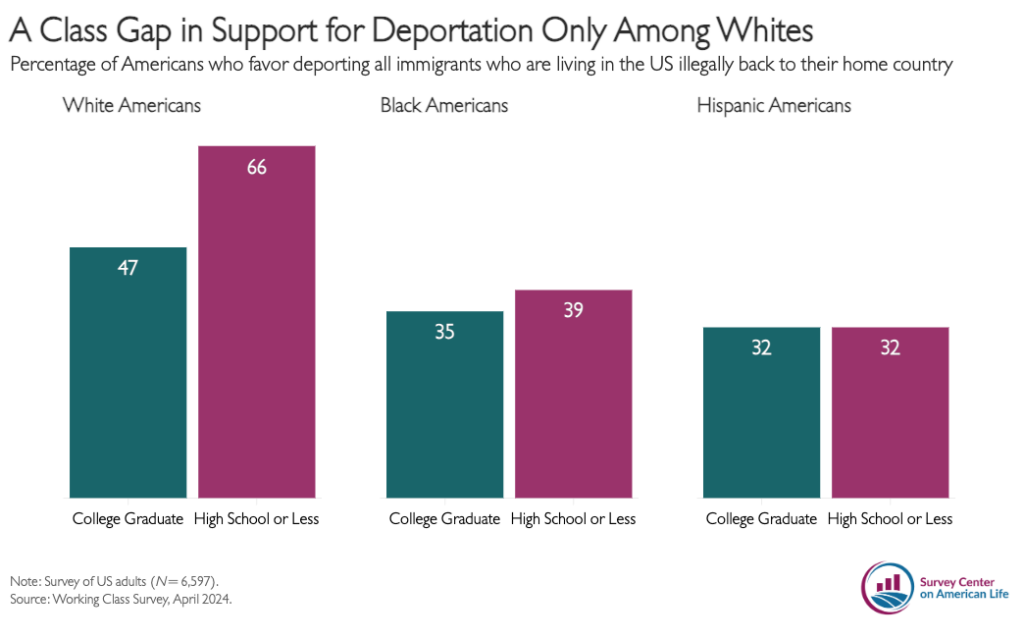Newsletter May 30, 2024
Get Out: More Americans Support Deporting Immigrants

Republicans have undergone a radical shift on immigration
Over the last 8 years, American attitudes toward deporting illegal immigrants have undergone a remarkable transformation. Until recently, Americans generally disapproved of immigrants who came to the U.S. through extra-legal means but stopped short of advocating for their removal. In July 2016, the same month that Donald Trump captured the Republican nomination for president, less than one-third (32 percent)of Americans said they were in favor of “deporting all immigrants living in the U.S. illegally back to their home country.” Nearly two-thirds of Americans opposed this policy. Support has grown steadily since then. In a new survey conducted by my team at the Survey Center on American Life, we find the public essentially divided. Half (50 percent) of Americans now favor deporting immigrants living in the U.S. illegally, while fewer than half (46 percent) remain opposed.

It’s (Probably) Not About Jobs
Rising support for deportation probably has little to do with the impact of undocumented immigrants on the job market. With the unemployment rate near historic lows and wages among low-skilled workers rising faster than at any time in recent history, few Americans report being concerned about economic competition from foreign-born workers. A 2024 Monmouth poll found that only 28 percent of Americans believe immigrants (legal or otherwise) compete with native-born Americans for the same employment opportunities. A 2022 PRRI poll found that most Americans do not believe immigrants are burdening local communities by using social services, although a significant minority cited this as a concern. Regardless of how the question is asked, polls generally find that Americans believe illegal immigrants benefit the country because of their work ethic and talents.
There is a class divide in support of deportation that might suggest economic considerations are not entirely irrelevant. Americans without a college education—who are far more likely to compete with immigrants for the same employment opportunities—more strongly support deportation than those with four-year degrees. The gap isn’t small either. On closer inspection, this gap is exclusive to white, non-Hispanic Americans. There is no education gap among black or Hispanic Americans, but a massive difference among whites. Sixty-six percent of white non-college Americans favor deporting all illegal immigrants, compared to less than half (47 percent) of white college graduates. What’s more, the group of white non-college Americans most supportive of deporting immigrants are those whose employment prospects are least affected by them—retirees.

A Republican Surge
So, what’s behind the rising support for deportation? Part of the answer depends on who has changed their attitude the most. That, at least, is clear: Republicans. Even if Republicans have traditionally expressed greater suspicion about immigration, there has been a pronounced change in opinion in the past few years. In 2016, Gallup found half of Republicans favored deporting immigrants living in the U.S. illegally. In 2024, a policy of deportation has become the mainstream position of the GOP—81 percent of Republicans now support it. Independents, and even Democrats, have also become more supportive of deportation, but the story here is the massive shift in Republican attitudes. Other polling shows a similar pattern.
So what do Republicans want? It’s not necessarily about following the rule of law – despite claims to the contrary. The rhetoric around the border wall seems to imply that illegal immigration is the principal concern, but a rising number of Americans want to tamp down on legal immigration. In 2023, Gallup found that 73% of Republicans want to reduce immigration, which matched the historical high-water mark.
Donald Trump is a critical factor in the GOP evolution on immigration. From the earliest moments of his campaign, Trump articulated a more aggressive and hostile approach towards immigrants than most other Republicans. He regularly talks about immigrants invading the country. At a recent rally in New York, Trump said migrants were emptying out of jails and mental institutions to commit “migrant crime” in the United States. “I think they’re building an army,” he said, “they want to get us from within.” MAGA Republicans have the most hostile views of immigrants and support the most draconian measures to address the border issue. Two-thirds of the most Trump-supporting Republicans say the U.S. should make border crossings for migrants more dangerous, a minority view among other Republicans.
It’s also hard to overstate the impact that the news media has had on Republican attitudes about immigration. Republicans who get their news primarily from Fox News or other conservative outlets have uniquely negative opinion of immigrants. An Ipsos poll found that 83 percent of Fox News viewers believe that the “Biden administration has opened the border to all undocumented immigrants,” and more than half believe (incorrectly) that immigrants are more likely to be criminals. Pew found that while Democrats are no less likely to consume ideologically friendly media, they tend to have a more diverse news diet than Republicans. The report notes, “While Democrats in the United States turn to and place their trust in a variety of media outlets for political news, no other source comes close to matching the appeal of Fox News for Republicans.” This gives conservative media outlets substantial agenda-setting power.
With immigration rates reaching near historically high levels, there are legitimate questions about national security, public safety, economic displacement, and patterns of cultural assimilation. Most of these concerns do not stand up to scrutiny. There is little evidence that immigrants fail to assimilate; in fact, research has found that immigrants have more positive views of the United States than native-born Americans. Research also shows immigrants are less likely to commit crimes than those born in the U.S.
The economic impact of immigrants is more difficult to sort out. Harvard Economist George Borjas has argued that immigration can and does create economic hardships for some workers, even as immigrants add billions to the national economy. More recent research by Benjamin Jones, a professor at Northwestern, shows that immigrants are far more likely to start businesses than native-born Americans. In The Atlantic, Jones writes that “immigrant founders are overrepresented as founders at every level of employment size, from firms employing a handful of workers to firms employing hundreds, thousands, or tens of thousands.” The economic impact can be measured in decades meaning that even if immigrants are responsible for economic dislocation in the short run, they generally produce lasting economic growth.
When Donald Trump first ran for president his aggressive posture on immigration—not to mention his divisive rhetoric—was significantly out of step with the public. This is probably less true today. If Trump is elected there may be far less public opposition to his plans to carry out mass deportations, and none at all within the GOP.
Read more on American Storylines








